Premium Only Content
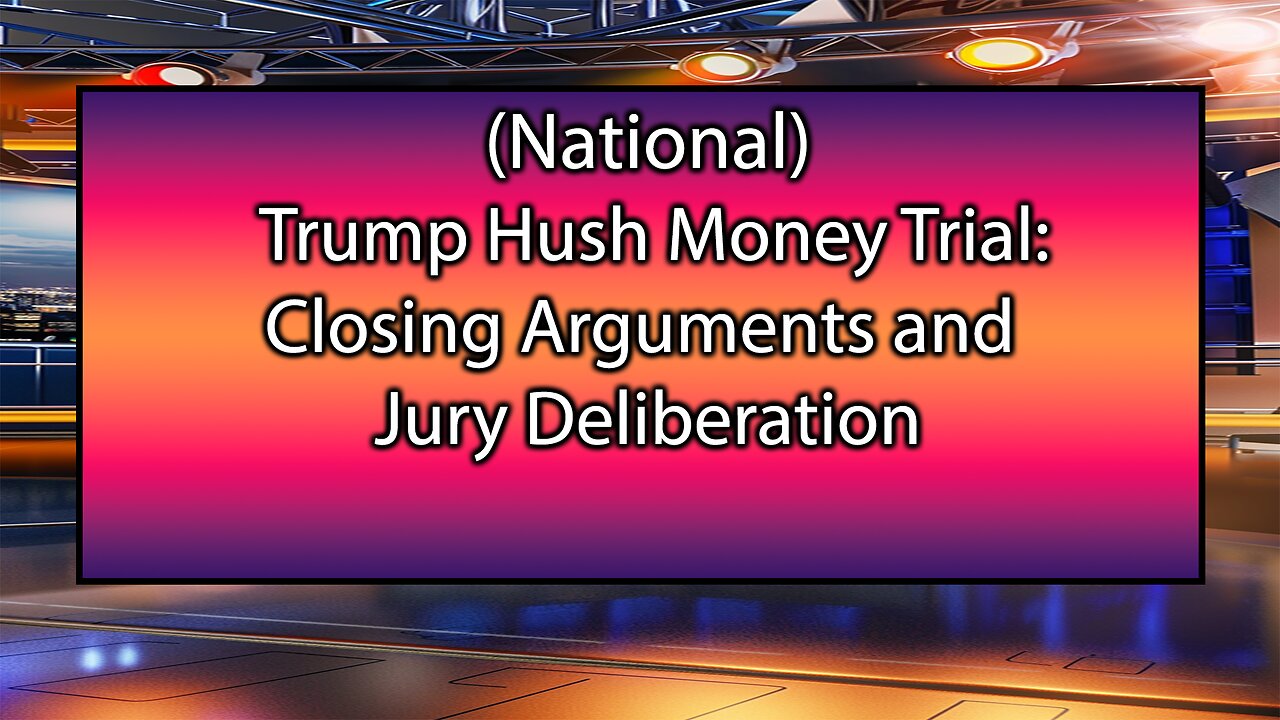
Trump Hush Money Trial: Closing Arguments and Jury Deliberation
On May 28, 2024, the hush money trial involving former President Donald Trump reached a pivotal moment as both the prosecution and defense delivered their closing arguments. This high-profile case has garnered significant media attention due to its potential political ramifications and the involvement of a former president.
Background of the Case
The case revolves around allegations that Trump falsified business records to conceal a $130,000 payment to adult film actress Stormy Daniels in the lead-up to the 2016 presidential election. The payment was allegedly made to silence Daniels about an affair she claims to have had with Trump in 2006. Trump has consistently denied the affair and pleaded not guilty to all charges.
The Manhattan District Attorney's Office, led by Alvin Bragg, has charged Trump with 34 counts of falsifying business records in the first degree. The prosecution argues that these falsifications were intended to cover up the payment and influence the outcome of the 2016 election
.
Prosecution's Closing Arguments
Prosecutor Joshua Steinglass presented a detailed and lengthy closing argument, emphasizing that the case was about a conspiracy and a cover-up orchestrated by Trump and his associates. Steinglass highlighted three payments: to former Trump Tower doorman Dino Sajudin, former Playboy model Karen McDougal, and Stormy Daniels. These payments were allegedly part of a "catch-and-kill" scheme to suppress negative stories about Trump
.
Steinglass argued that the payment to Daniels was an unlawful campaign contribution, asserting that the Trump campaign and American Media Inc. coordinated to influence the election through these payments. He described the scheme as a subversion of democracy and insisted that Trump's intent to defraud could not be clearer
.
Defense's Closing Arguments
Trump's defense team, led by attorney Todd Blanche, countered by questioning the credibility of key prosecution witnesses, particularly Michael Cohen, Trump's former attorney who facilitated the payment to Daniels. The defense portrayed Cohen as a serial liar and emphasized that Trump did not personally handle the payment arrangements, relying on his subordinates to manage such matters
.
Blanche argued that the prosecution failed to prove beyond a reasonable doubt that Trump intended to commit a crime. He also highlighted inconsistencies in the prosecution's case, noting that the Federal Election Commission and the Department of Justice had not found sufficient grounds to pursue charges related to the payment
.
Key Witness Testimonies
Several key witnesses testified during the trial, including Cohen and Daniels. Cohen admitted to making the payment but claimed it was done to protect Trump from potential embarrassment. Daniels testified about her interactions with Trump and the payment made to her, reinforcing the prosecution's narrative of a cover-up
.
David Pecker, former publisher of the National Enquirer, also testified, confirming that "catch-and-kill" practices were common and had been used to protect Trump on multiple occasions. Pecker's testimony aimed to show a pattern of behavior that supported the prosecution's case
.
Legal and Political Implications
The trial has significant legal and political implications. A conviction could impact Trump's ability to campaign for the 2024 presidential election, while an acquittal might bolster his claims of being a victim of political persecution. The case has also raised questions about the role of state prosecutors in pursuing charges related to federal election laws
.
Jury Deliberation
As the jury begins deliberations, they face the complex task of determining whether the prosecution has proven that Trump falsified business records with the intent to conceal a crime. The jury must consider the credibility of witnesses, the evidence presented, and the legal standards for convicting a former president
.
Judge's Role and Jury Instructions
Judge Juan Merchan has played a critical role in the trial, overseeing the proceedings and ruling on various motions from both the prosecution and defense. One significant aspect of his involvement has been the jury instructions, which are crucial in guiding the jury's deliberations. Merchan's decisions on what evidence is admissible and his rulings on objections have influenced the trial's direction
.
Judge Merchan instructed the jury on the legal standards they must consider, emphasizing that the prosecution must prove beyond a reasonable doubt that Trump intended to falsify business records to commit or conceal a crime. The jury was also reminded of the presumption of innocence and the need to consider each charge individually
.
Prosecution's Evidence and Strategy
The prosecution's strategy hinged on presenting a cohesive narrative that linked Trump's actions to an overarching scheme to influence the 2016 election. Prosecutor Steinglass argued that the falsified business records were part of a concerted effort to cover up the payments and prevent damaging information from surfacing during the campaign
.
Steinglass meticulously outlined the timeline of events, highlighting communications between Trump, Cohen, and Pecker. The prosecution's evidence included emails, financial records, and testimonies from individuals directly involved in the payments. Steinglass's closing argument stressed that Trump's actions were deliberate and aimed at deceiving the public and election authorities
.
Defense's Evidence and Strategy
The defense focused on undermining the prosecution's narrative by challenging the credibility of key witnesses and questioning the interpretation of the evidence. Todd Blanche emphasized that the payments were personal matters unrelated to the election and argued that Trump had no intent to defraud
.
Blanche highlighted inconsistencies in the testimonies of Cohen and other witnesses, portraying them as motivated by personal gain or animosity towards Trump. The defense also pointed out that regulatory bodies like the Federal Election Commission had not pursued charges related to the payments, suggesting that the prosecution's case was weak
.
Media and Public Reactions
The trial has been a focal point for media coverage, with outlets from across the political spectrum providing extensive analysis and updates. Conservative media have generally framed the trial as a politically motivated attack on Trump, while liberal media have emphasized the seriousness of the charges and the evidence presented by the prosecution
.
Public opinion has been sharply divided, reflecting broader political polarization in the United States. Trump's supporters view the trial as a continuation of efforts to undermine his political career, while his critics see it as a necessary step in holding him accountable for alleged misconduct
.
Potential Outcomes and Implications
The jury's verdict will have significant implications for Trump and the broader political landscape. A conviction could complicate Trump's bid for the 2024 presidential election, potentially disqualifying him from running or damaging his campaign's credibility. Conversely, an acquittal might embolden Trump and his supporters, reinforcing claims of political persecution.
Beyond Trump's immediate political future, the trial also raises important questions about the accountability of public officials and the intersection of personal and political conduct. The case has highlighted the challenges of prosecuting high-profile figures and the complexities of legal standards in politically charged cases
.
Conclusion
The Trump hush money trial has captivated public attention and underscored deep divisions in American society. As the jury deliberates, the nation awaits a verdict that will not only determine Trump's legal fate but also influence the political discourse leading up to the 2024 election. The trial serves as a reminder of the enduring impact of legal battles on the political landscape and the ongoing debate over the integrity and accountability of public officials
-
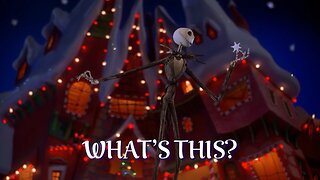 2:48
2:48
Steven Crowder
10 hours agoCROWDER CLASSICS: What’s This? | Nightmare Before Kwanzaa (Nightmare Before Christmas Parody)
182K12 -
 LIVE
LIVE
LFA TV
11 hours agoLFA TV CHRISTMAS EVE REPLAY
886 watching -
![ROSEANNE BARR - Her Journey, TRUMP, and the MAGA GOLDEN AGE! [INTERVIEW]](https://1a-1791.com/video/s8/1/M/m/B/2/MmB2v.0kob.1-small-ROSEANNE-BARR-Her-Journey-T.jpg) 51:35
51:35
Dr Steve Turley
1 day ago $13.12 earnedROSEANNE BARR - Her Journey, TRUMP, and the MAGA GOLDEN AGE! [INTERVIEW]
31.9K47 -
 57:38
57:38
The Tom Renz Show
5 hours agoMerry Christmas - The Tom Renz Show Christmas
60.4K10 -
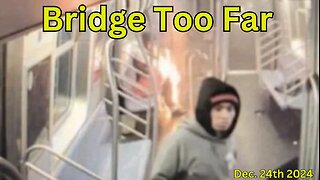 2:59:10
2:59:10
Wendy Bell Radio
15 hours agoThe Bridge Too Far
145K216 -
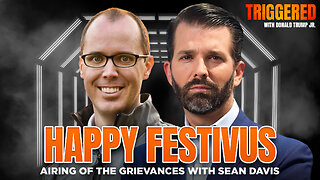 1:03:45
1:03:45
Donald Trump Jr.
1 day agoHappy Festivus: Airing Our Grievances and Stopping The Swamp w/Sean Davis | TRIGGERED Ep.201
410K535 -
 1:30:30
1:30:30
Game On!
18 hours ago $7.59 earnedTop 5 things you need to know for Sports Christmas!
63.9K5 -
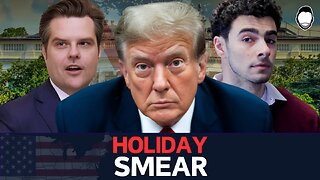 1:58:10
1:58:10
Robert Gouveia
1 day agoMatt Gaetz REJECTS Report, Sues Committee; Luigi Fan Club Arrives; Biden Commutes; Festivus Waste
288K227 -
 1:31:40
1:31:40
Adam Does Movies
1 day ago $15.83 earnedThe Best & Worst Christmas Movies! - LIVE!
112K8 -
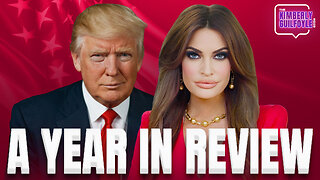 58:10
58:10
Kimberly Guilfoyle
1 day agoAmerica is Back & The Future is Bright: A Year in Review | Ep. 183
200K76